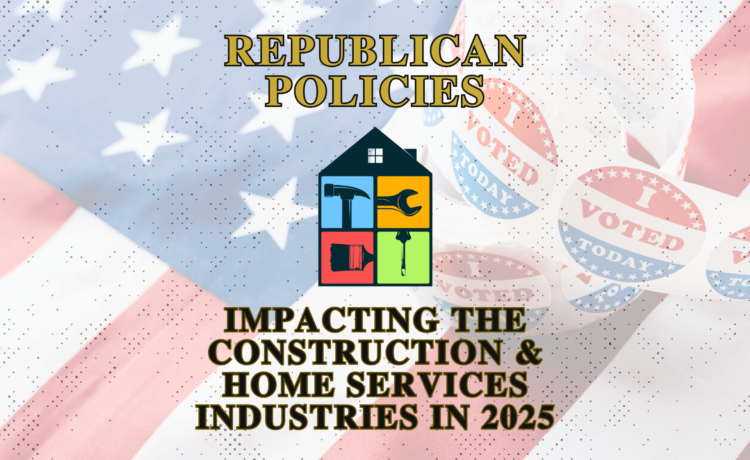
With the Republican Party back in power, potential shifts in policy and economic focus may influence various industries, including construction and home services. Here are some anticipated impacts that professionals in these fields might expect:
1. Regulatory Changes and Compliance Requirements
- The Republican-led government may prioritize reducing regulations, which could positively affect the construction and home services industries. By simplifying or relaxing certain compliance requirements, contractors and service providers might experience lower operational costs and fewer bureaucratic hurdles. For example, environmental and labor regulations may see changes, allowing more flexibility in project timelines and resource allocation.
2. Tax Cuts and Financial Incentives
- Historically, the Republican Party has supported tax cuts to encourage business growth. This could translate into reduced corporate tax rates, which would benefit small businesses and contractors, making it easier for them to reinvest in their companies. Additionally, there may be incentives for hiring or investing in new equipment, directly impacting the construction and home services sectors.
3. Increased Focus on Infrastructure Development
- Republican leadership may prioritize infrastructure projects, such as roads, bridges, and energy facilities. This could lead to a rise in demand for skilled trades and construction services. Home service businesses may indirectly benefit as new infrastructure projects create job opportunities and population growth in certain areas, increasing the need for residential services like HVAC installation, plumbing, and landscaping.
4. Potential Shifts in Affordable Housing Policies
- Affordable housing initiatives may face changes under a Republican administration, with more focus on private sector involvement and reduced federal funding. This may lead to slower growth in affordable housing projects, potentially impacting contractors who work with government-funded housing. However, there could be incentives for private developers, which may open up new opportunities for home service providers in markets previously driven by government contracts.
5. Labor Market Impact and Immigration Policy
- The home services and construction industries rely heavily on skilled labor, and shifts in immigration policy could influence workforce availability. If the Republican Party strengthens immigration restrictions, labor shortages could become a concern, especially in sectors that depend on immigrant workers. Companies may need to focus on workforce development and training to bridge any gaps left by these policies.
6. Energy Policies Affecting HVAC and Solar Markets
- Changes in energy policy, including reduced emphasis on renewable energy mandates, could impact sectors like solar installation. On the other hand, HVAC and energy-efficiency projects might see a boost if incentives or rebates are redirected toward conventional energy and modernization of existing systems, providing opportunities for service providers specializing in energy-efficient retrofitting.
7. Interest Rates and Market Stability
- With a focus on reducing inflation, a Republican-led government may support policies that stabilize interest rates, impacting the housing market and related industries. Lower interest rates could stimulate new home construction and home improvement projects, while higher rates could curb growth. This variability requires contractors and home service providers to monitor market trends and adjust business strategies accordingly.
Overall, while the Republican Party in power may bring relief from certain regulations and stimulate economic growth through tax cuts and infrastructure projects, it also brings uncertainties regarding labor availability and specific market conditions. Businesses in the construction and home services industry should stay agile, leverage any new incentives, and prepare for potential shifts in labor policy to remain competitive.















